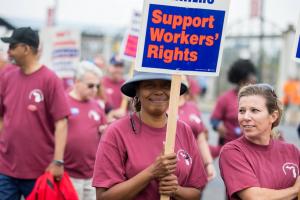 The prophet Jeremiah has a warning for those willing to exploit labor: “Woe to him who builds his house by unrighteousness, and his upper rooms by injustice; who makes his neighbor serve him for nothing, and does not give him his wage” (Jer. 22:13 RSV). All Workers should earn a just wage. Pope Francis indicated that giving someone less than their fair share, less than a wage which they can live on, is not only exploitation, but a mortal sin.
The prophet Jeremiah has a warning for those willing to exploit labor: “Woe to him who builds his house by unrighteousness, and his upper rooms by injustice; who makes his neighbor serve him for nothing, and does not give him his wage” (Jer. 22:13 RSV). All Workers should earn a just wage. Pope Francis indicated that giving someone less than their fair share, less than a wage which they can live on, is not only exploitation, but a mortal sin.
If an employee finds their rights violated by their employer, they should be able to have their violation properly addressed. If they are forced to work overtime without proper pay, if they suffer an injury at work, if they are mistreated, harassed, or abused in any way, it should not be difficult for them to deal with their grievances and find a remedy for them.
Corporations, however, do everything they can to keep their profits at the expense of workers. Corporations, which are themselves an amalgamation of many different people and their resources into one legal entity, come to the bargaining table with an unfair advantage over their would-be-employees, often forcing them to sign waivers to their rights in order to receive employment. Corporations hate the notion of workers uniting together to protect each other and their rights because that helps level the field at the bargaining table. Corporations hate unions, but they also hate any attempt of workers to organize together to battle injustice. When workers started to unite in order to protect their rights, corporations began making demands on workers, forcing them to sign away their rights to organize together in arbitrations if and when any particular worker found their rights violated. Corporations knew that this would give them an unfair advantage whenever workers took just grievances against their employers to arbitration, for corporations, which are organizations with great resources and power, will be able to stomp out any and all individuals by the might of their collective whole.
Workers, having been forced to sign away their rights for the sake of employment, took their contracts to the courts, asking the courts to overturn what they were unjustly forced to sign. Morally speaking, when corporations use their power to force workers to sign away their rights just to get a job, the contract is unjust, and not binding. [1] Knowing that the state must work for the benefit of justice, they believed that the courts would do their duty and recognize the rights of workers.
Sadly, the United States was once again rejected moral objectivity for the sake of the rich. On May 21, 2018, the Supreme Court ruled that corporations can force their employees to sign contracts, for the sake of employment, which say that if a worker ever has to fight against their employer due to some violation of their rights, they must do so individually, not collectively. That is, for workers to be employed, employers can force them to sign documents which violate the dictates of justice.. The foundation for their decision was a poor application of the Federal Arbitration Act of 1925.They ignored the National Labor Relations Act of 1935 and many other laws enacted by Congress in the decades after 1925 which should have been read with and Arbitration Act of 1925. They ignored that the rule of law is for the sake of justice and instead of turned it into the justification for power.
Judge Ruther Bader Ginsburg, in her dissent, understood what was at stake: “When workers charge their employers with unlawful conduct — in this case, violations of laws governing wages earned and hours worked — there is strength in numbers.” Corporations have their strength and power in numbers. The only way the rights of workers can be protected is if they are able to likewise come together and respond with numbers of their own.
Forcing would-be-employees to reject an important means of addressing grievances for the sake of work violates basic rights which all employees possess. As the U.S. Catholic Bishops indicated in Economic Justice For All, human dignity is undermined when workers are unable to organize together to protect their own rights: “No one may deny the right to organize without attacking human dignity itself. Therefore, we firmly oppose organized efforts, such as those regrettably now seen in this country, to break existing unions and prevent workers from organizing.”[2] Who can deny that the Supreme Court has undermined human dignity when it has given corporate powers rights above employees, giving privilege to monstrous entities over human subjects?
The so-called free market will not be able to correct this abuse. As Pope Francis indicated, when two nations come together to bargain, the one with the power will make sure everything comes to their own advantage. What is true with nations is also true with corporations and their employees; contracts, even when agreed upon, end up unbalanced and unfair:
It is evident that the principle of free trade, by itself, is no longer adequate for regulating international agreements. It certainly can work when both parties are about equal economically; in such cases it stimulates progress and rewards effort. That is why industrially developed nations see an element of justice in this principle.
But the case is quite different when the nations involved are far from equal. Market prices that are freely agreed upon can turn out to be most unfair. It must be avowed openly that, in this case, the fundamental tenet of liberalism (as it is called), as the norm for market dealings, is open to serious question.[3]
Workers must be seen as people with rights and privileges, with a dignity that must be honored. As Saint John XXIII said, employees must be assured that their dignity is not established by what the market dictates, but by justice:
They concern first of all the question of work, which must be regarded not merely as a commodity, but as a specifically human activity. In the majority of cases a man’s work is his sole means of livelihood. Its remuneration, therefore, cannot be made to depend on the state of the market. It must be determined by the laws of justice and equity. Any other procedure would be a clear violation of justice, even supposing the contract of work to have been freely entered into by both parties.[4]
The Supreme Court, by ignoring the injustice involved in the contracts, has indicated that they have abandoned the principles of the Constitution. They have forsaken the general welfare of the people of the United States. The blessings of liberty, far from being secured for ourselves and our children, has been cast aside, as workers find their liberty rejected for the sake of inhuman corporate powers. The church must answer back and fight in solidarity with the workers of the world. What St. John Paul II wrote in Laborem Exercens, must be once again reiterated:
In order to achieve social justice in the various parts of the world, in the various countries, and in the relationships between them, there is a need for ever new movements of solidarity of the workers and with the workers. This solidarity must be present whenever it is called for by the social degrading of the subject of work, by exploitation of the workers, and by the growing areas of poverty and even hunger. The Church is firmly committed to this cause, for she considers it her mission, her service, a proof of her fidelity to Christ, so that she can truly be the “Church of the poor”.[5]
We still have the need for a new, powerful movement of the workers of the United States. They need to come together and say “no more” to the abusive powers being granted to corporations. Since the Supreme Court as validated such abuse by the rule of immoral laws, they must speak together in denial of those laws, force them to be repealed, and have put in place new laws which protect their rights individually and collectively so that human dignity will not be undermined.
[Image=Debbie Stabenow marches on Labor Day 2017 by Office of Debbie Stabenow [Public domain], via Wikimedia Commons]
[1] In Centesimus Annus, St. John Paul II noted the need for the state to intervene when just wages, even if and when the workers agreed to such injustice by contract:
The Pope immediately adds another right which the worker has as a person. This is the right to a “just wage”, which cannot be left to the “free consent of the parties, so that the employer, having paid what was agreed upon, has done his part and seemingly is not called upon to do anything beyond”. It was said at the time that the State does not have the power to intervene in the terms of these contracts, except to ensure the fulfilment of what had been explicitly agreed upon. This concept of relations between employers and employees, purely pragmatic and inspired by a thorough-going individualism, is severely censured in the Encyclical as contrary to the twofold nature of work as a personal and necessary reality. For if work as something personal belongs to the sphere of the individual’s free use of his own abilities and energy, as something necessary it is governed by the grave obligation of every individual to ensure “the preservation of life”. “It necessarily follows”, the Pope concludes, “that every individual has a natural right to procure what is required to live; and the poor can procure that in no other way than by what they can earn through their work”.
A workman’s wages should be sufficient to enable him to support himself, his wife and his children. “If through necessity or fear of a worse evil the workman accepts harder conditions because an employer or contractor will afford no better, he is made the victim of force and injustice”.
Would that these words, written at a time when what has been called “unbridled capitalism” was pressing forward, should not have to be repeated today with the same severity. Unfortunately, even today one finds instances of contracts between employers and employees which lack reference to the most elementary justice regarding the employment of children or women, working hours, the hygienic condition of the work-place and fair pay; and this is the case despite the International Declarations and Conventions on the subject and the internal laws of States. The Pope attributed to the “public authority” the “strict duty” of providing properly for the welfare of the workers, because a failure to do so violates justice; indeed, he did not hesitate to speak of “distributive justice”.
[2] US. Catholic Bishops. Pastoral Letter, Economic Justice for All.
[3] Pope Paul VI. Populorum Progressio. Vatican Translation.
[4] St. John XXIII. Mater et Magistra. Vatican Translation.
[5] St. John Paul II, Laborem Exercens. Vatican Translation.
Stay in touch! Like A Little Bit of Nothing on Facebook













